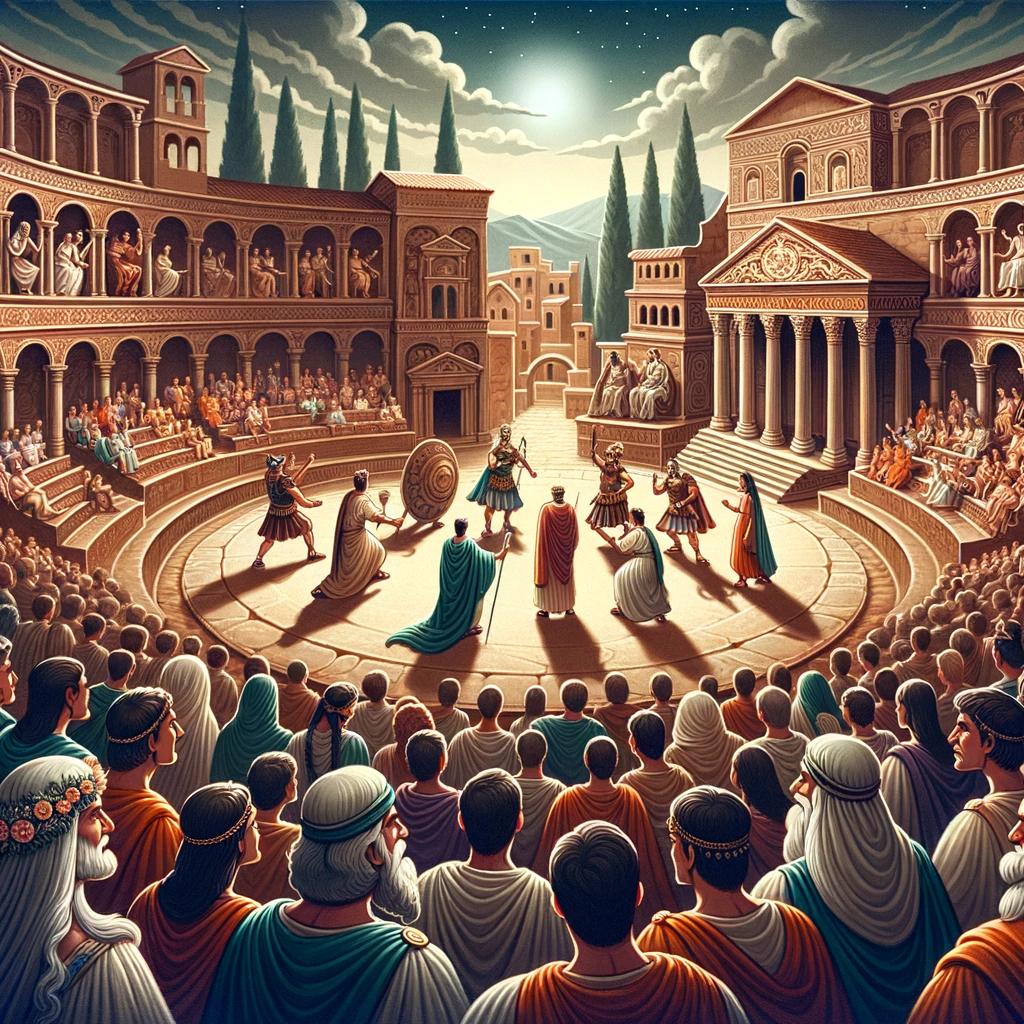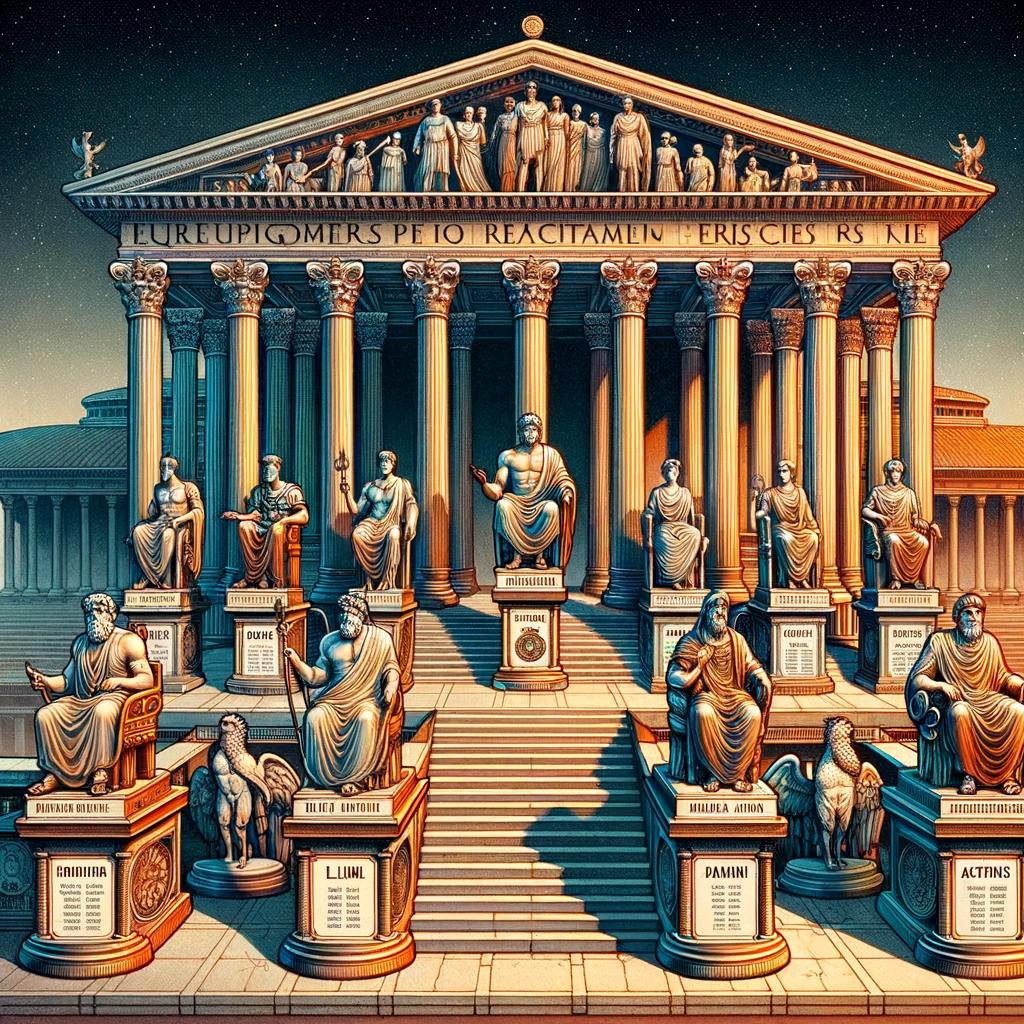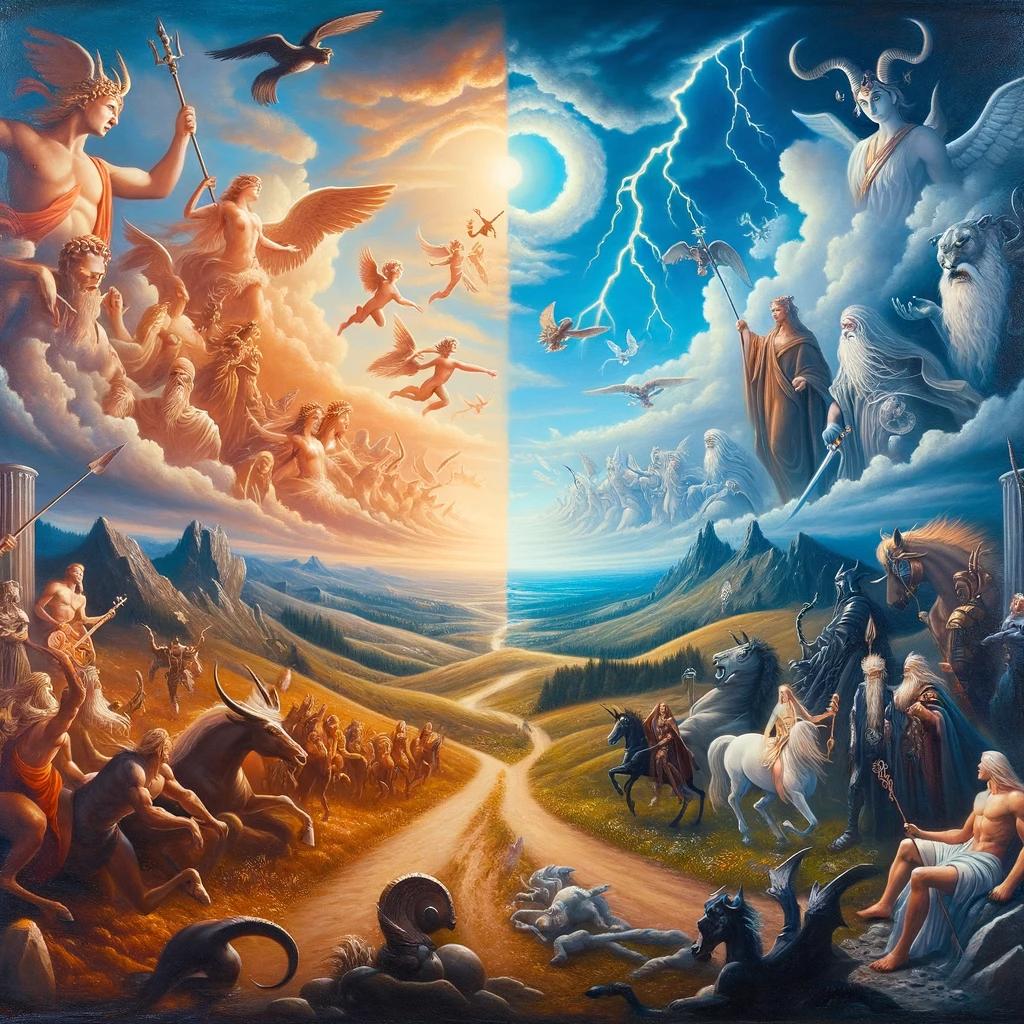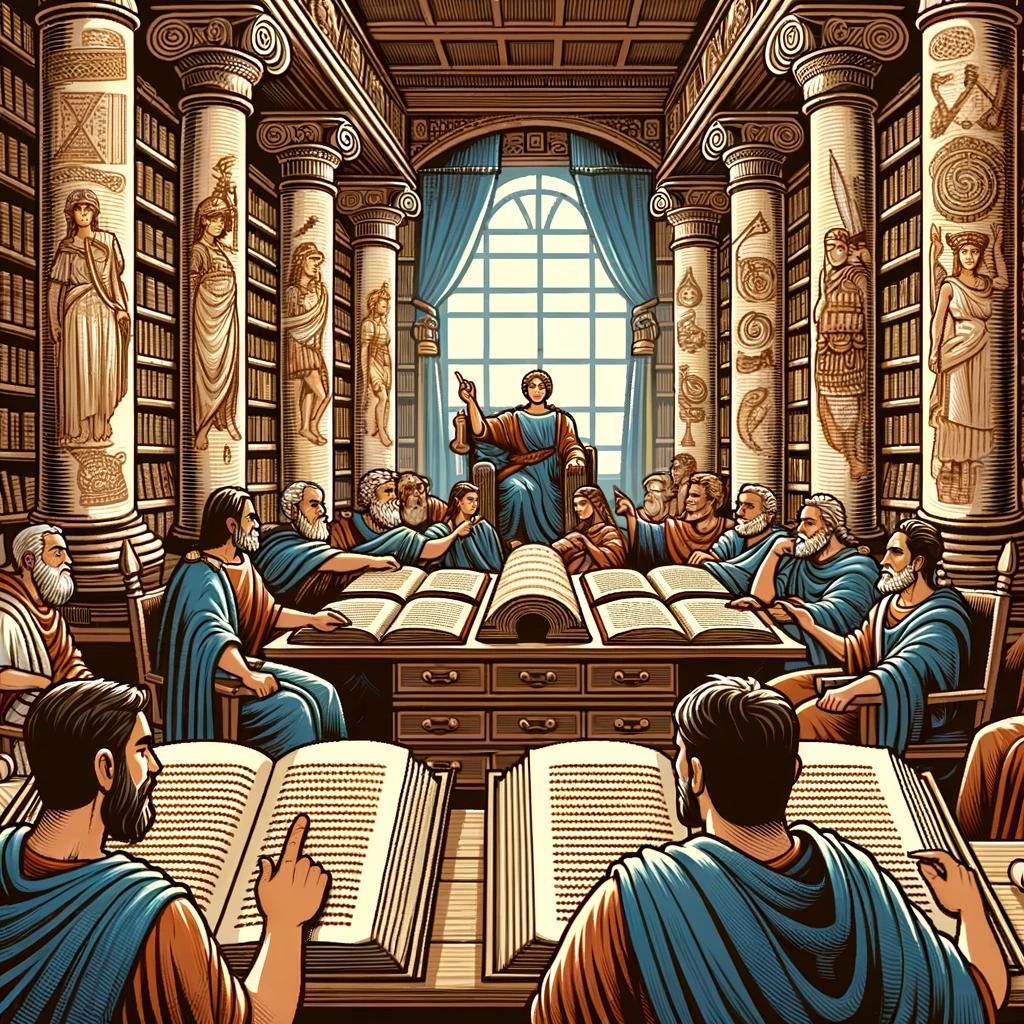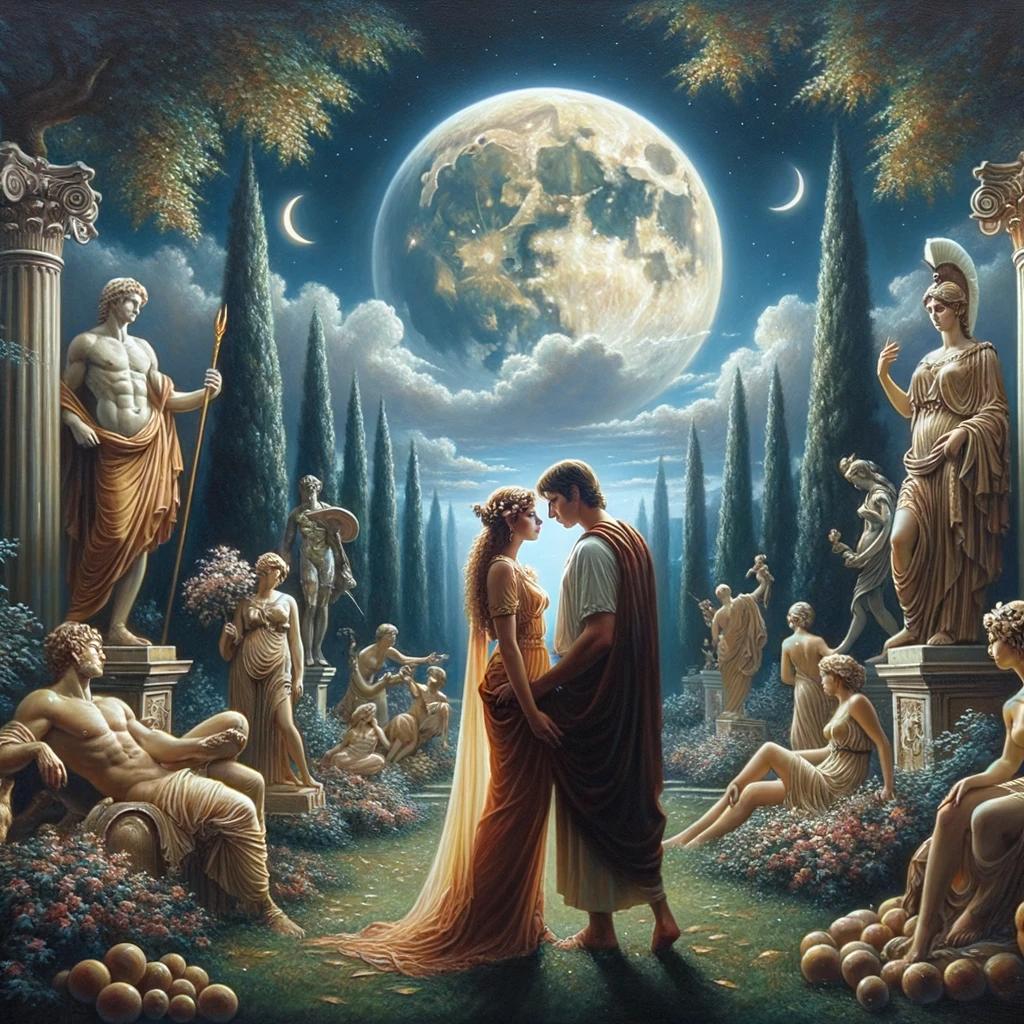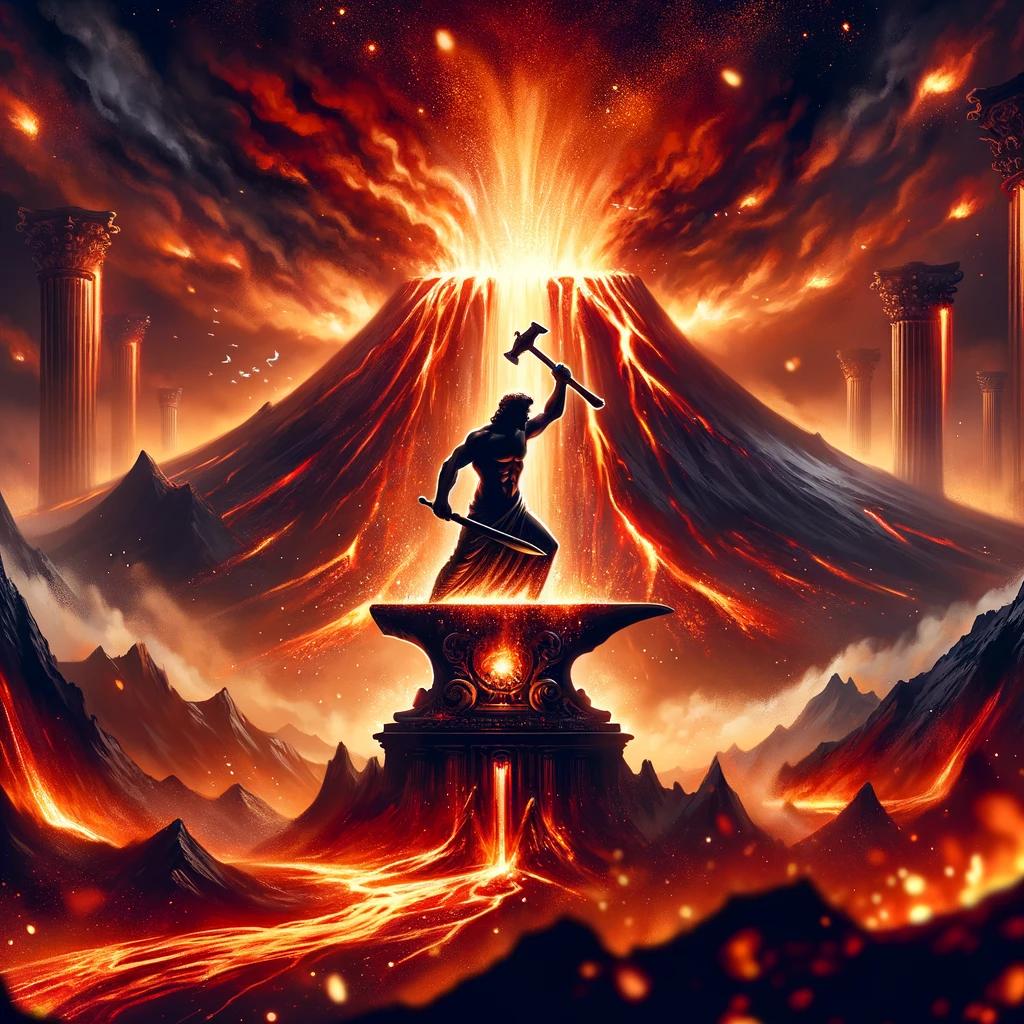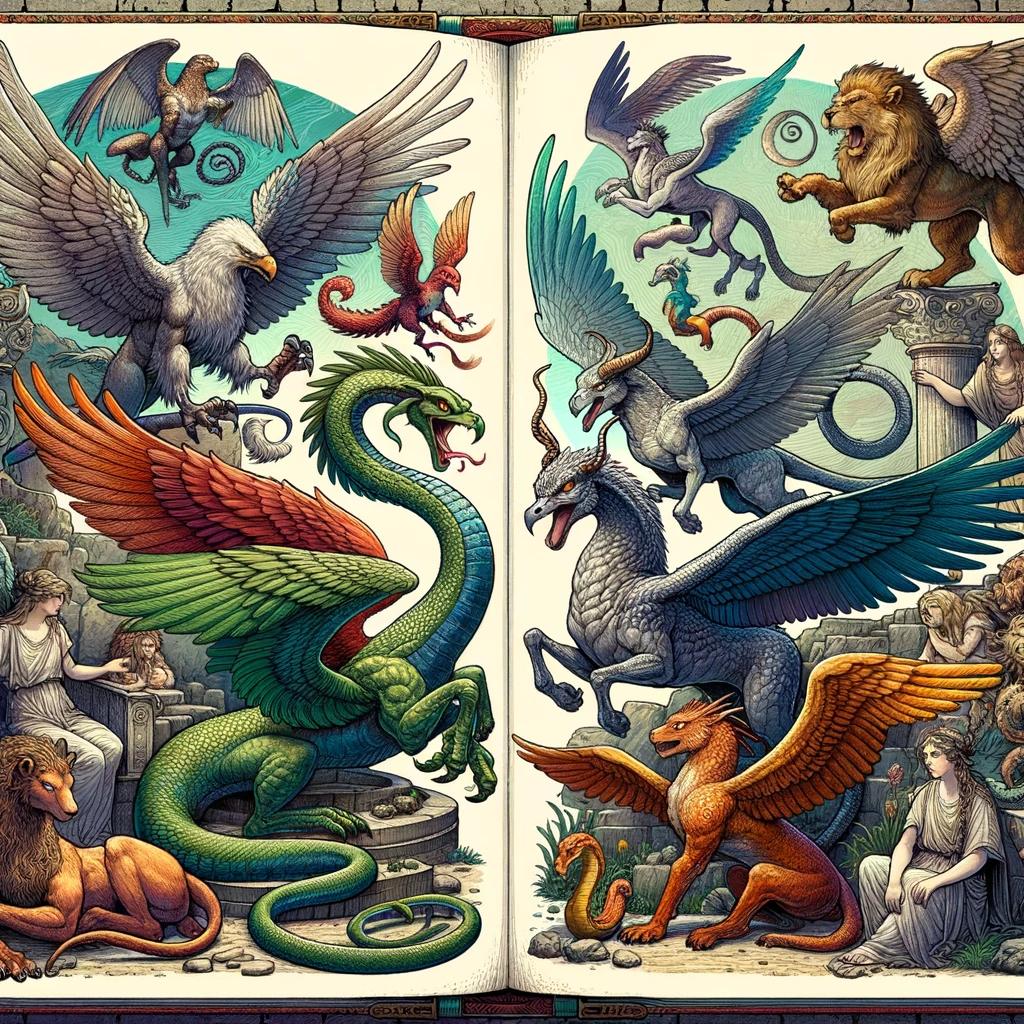Exploring Roman Mythology Afterlife: A Fascinating Journey into Ancient Beliefs

Roman Mythology Afterlife delves into the fascinating beliefs and rituals surrounding the realm of the dead in ancient Roman culture. From the divine pantheon of Roman gods and goddesses to the concept of Elysium influenced by Greek mythology, this article explores the diverse aspects of Roman afterlife.
Journey through the underworld with the Manes, understanding their role in death rituals and ancestral worship. Discover the rituals and guardians of the Roman home, gaining insights into the early beliefs and evolving nature of Roman afterlife.
Step into the intriguing world of Roman mythology afterlife.
Overview of Roman Mythology Afterlife
The concept of the afterlife held a significant place in Roman mythology. It was believed that life did not end with death, but rather, it continued in another realm. In this overview, we will explore the fascinating beliefs and practices of Roman mythology afterlife.
Roman mythology was rich with gods and goddesses who played crucial roles in determining the fate of souls after death. These deities formed a divine pantheon, each with their unique domain and influence.
Understanding the names and attributes of these gods and goddesses provides insight into the complex structure of Roman afterlife beliefs.
While the Roman afterlife shared many similarities with Greek mythology, the concept of Elysium held particular significance. Influenced by their Greek counterparts, the Romans envisioned Elysium as a paradise reserved for heroes and virtuous individuals.
Exploring the connection between Greek mythology and Roman afterlife sheds light on the evolution of these beliefs.
Within the Roman pantheon, specific gods were associated with the afterlife. These gods played crucial roles in guiding and overseeing the souls of the deceased. Understanding the significance of these deities offers a deeper understanding of Roman afterlife beliefs and rituals.
In Roman mythology, the role of Manes was vital in the afterlife. Manes represented the collective spirits of the deceased and played a crucial part in funeral rituals and ancestral worship.
Exploring the journey of the soul to the underworld and the rituals and offerings made for the Manes provides insight into the intricate beliefs surrounding death and the afterlife in ancient Rome.
Family and ancestral worship held a significant place in Roman afterlife beliefs. Honoring and venerating ancestors was not only a cultural practice but also held implications for the well-being of the living and the spiritual realm.
Understanding the role of family and ancestral worship provides a deeper appreciation for the complexities of Roman afterlife beliefs.
The Roman home served as a sacred space for the living and the dead. Guardians, known as Lares and Penates, protected both the household and its inhabitants. Exploring the rituals and symbols associated with the Roman home provides a unique perspective on the intertwining of the physical and spiritual realms in Roman afterlife beliefs.
Over time, Roman afterlife beliefs evolved, influenced by various factors such as societal changes, religious movements, and contact with other cultures. Examining the early beliefs and their evolution offers a glimpse into the dynamic nature of Roman afterlife concepts.
By delving into the intricacies of Roman afterlife relationships, we gain insight into the diverse forms of connections that existed between the living and the dead. Understanding these relationships sheds light on the profound impact of the spiritual realm on various aspects of Roman life.
Religion played a central role in shaping Roman afterlife beliefs. From traditional Roman gods to the introduction of Eastern mystery religions, the influence of religious practices and beliefs is evident in the Roman concept of the afterlife.
Exploring the interplay between religion and Roman afterlife provides a comprehensive understanding of these ancient beliefs.
Embark on an enlightening journey into the realm of the dead as we delve into the captivating world of Roman mythology afterlife. Gain a deeper appreciation for the complex beliefs, rituals, and entities associated with the spiritual realm in ancient Rome.
Beliefs and Worship of Roman Gods and Goddesses
Beliefs and worship were integral parts of Roman society, with a pantheon of gods and goddesses occupying a central role in the spiritual lives of the people.
Roman Gods: A Divine Pantheon
In Roman mythology, the gods formed a divine pantheon with each deity holding their own distinct powers and attributes.
Jupiter, the king of gods, represented the forces of sky and thunder, while Neptune ruled over the sea and Pluto presided over the underworld.
Mars personified war and victory, Venus was associated with love and beauty, and Apollo was the god of sun and music.
These are just a few examples of the multitude of divine figures in Roman mythology.
Exploring Roman Gods and Goddesses Names
The gods and goddesses in Roman mythology had numerous names and epithets, reflecting different aspects of their character or their connection to specific domains. For instance, Jupiter was also known as Jove or Optimus Maximus, representing his supreme nature.
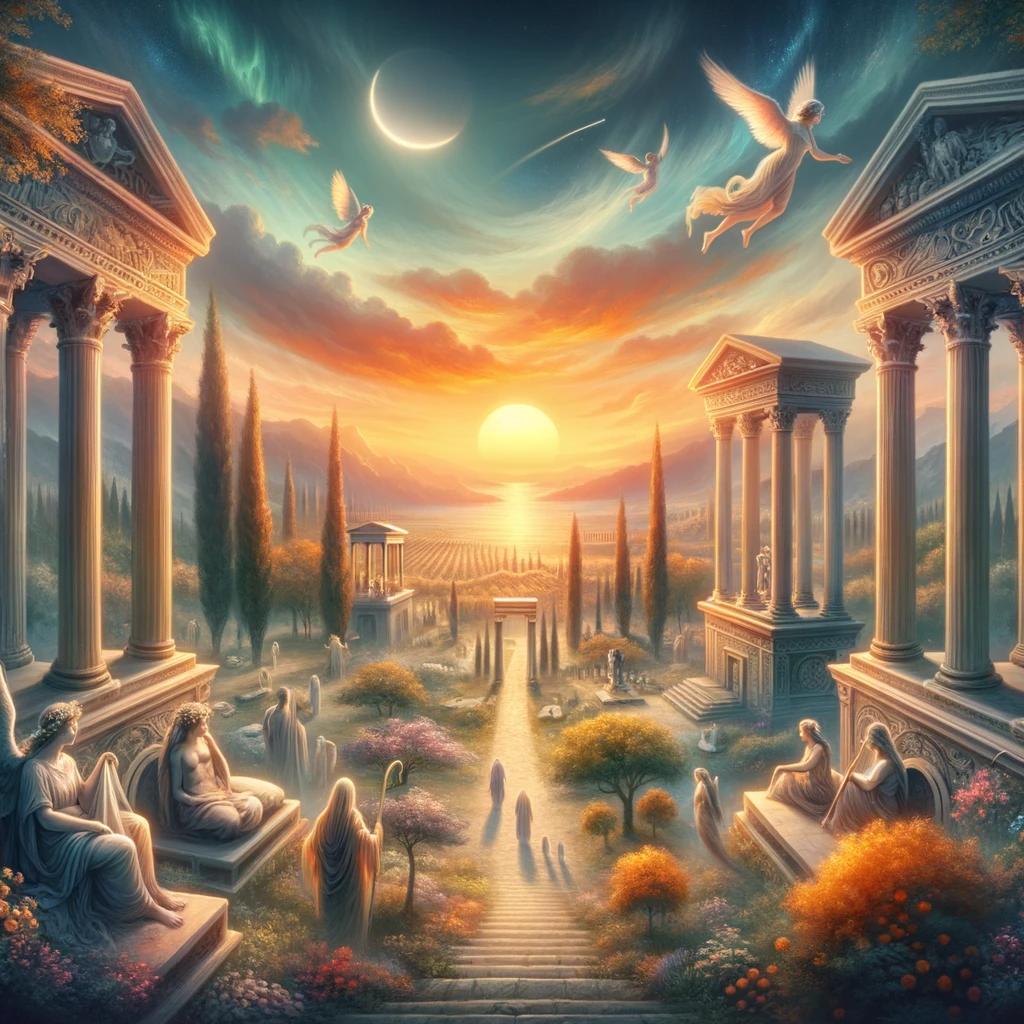
Mars had the epithet Mars Gradivus, depicting his role as the god of war, while Venus was referred to as Venus Genetrix, symbolizing her association with motherhood and fertility.
Understanding the various names and titles associated with the Roman gods offers insights into their multifaceted nature and their significance in different aspects of life.
The Concept of Elysium in Greek Mythology and its Influence on Roman Afterlife
In Greek mythology, Elysium was a paradise-like realm reserved for the blessed and heroic individuals after death.
It was a place of eternal bliss and rewarded those who had lived virtuous lives. This concept of Elysium had a significant influence on Roman afterlife beliefs and practices.
The Romans, heavily influenced by Greek culture, adopted the idea of Elysium and incorporated it into their own belief system. However, they modified it to align with their own cultural and religious traditions.
In Roman mythology, Elysium became known as the Elysian Fields and was envisioned as a beautiful and tranquil place where the souls of the righteous would reside in peace and happiness.
The influence of Greek mythology on Roman afterlife beliefs extended beyond just the concept of Elysium. It also impacted other aspects such as the existence of the Underworld and the roles of various gods and goddesses associated with the afterlife.
The Roman pantheon incorporated deities such as Hades, the ruler of the Underworld, and Persephone, his wife and queen, into their own mythology.
Additionally, the concept of Elysium in Greek mythology influenced the Roman perspective on the rewards and punishments in the afterlife. Just as virtuous individuals were rewarded in Elysium, the Romans believed that those who led morally upright lives would be granted a pleasant afterlife, while those who were wicked would face torment and suffering.
The influence of the concept of Elysium in Roman afterlife beliefs illustrates the interconnectedness of ancient mythologies and how ideas and beliefs were shared and adapted across different cultures.
It also showcases the rich tapestry of Roman mythology and the profound impact of Greek mythology on shaping their understanding of the afterlife.
Understanding the Roman Gods List Associated with the Afterlife
The ancient Romans believed in a complex pantheon of gods and goddesses, each with specific domains and powers.
When it comes to the afterlife, certain deities held particular significance.
- Dis Pater: As the ruler of the underworld, Dis Pater played a crucial role in Roman afterlife beliefs.
He was often associated with Pluto, the Greek god of the underworld.
- Proserpina: Also known as Persephone in Greek mythology, Proserpina was the daughter of Ceres (goddess of agriculture) and became the queen of the underworld after being abducted by Dis Pater.
- Fides: Representing faith and trust, Fides played a significant part in the afterlife.
Romans believed that their loyalty and faithfulness to the gods were crucial for a favorable afterlife.
- Mercury: Known as Hermes in Greek mythology, Mercury was a messenger of the gods and assisted souls in their journey to the afterlife.
He was often depicted as a guide for the deceased.
- Fortuna: As the goddess of fortune and fate, Fortuna influenced one’s destiny in the afterlife. Romans believed that she determined the rewards and punishments one received based on their actions during life.
- Larvae: These were malevolent spirits of the dead who haunted the living.
Romans believed that appeasing them with offerings and rituals was essential to avoid their torment in the afterlife.
These are just a few examples of the numerous gods and goddesses associated with the Roman afterlife.
Understanding their roles and significance provides insight into the beliefs and practices surrounding death and the afterlife in ancient Roman mythology.
The Role of Manes in Roman Afterlife Beliefs
The ancient Romans held strong beliefs regarding the afterlife, and central to these beliefs were the Manes, the spirits of deceased ancestors. Understanding the role of Manes is crucial to comprehending the complex Roman afterlife beliefs and practices.
Death and the Manes: A Journey to the Underworld
In Roman mythology, death was viewed as a transition to the realm of the dead. The journey to the underworld, known as the “Inferi,” was guided by the Manes. It was believed that upon death, the soul would descend into the underworld, where it would join the company of the Manes.
The Manes acted as intermediaries between the living and the dead. They were considered benevolent spirits who protected and guided their living descendants. The Romans believed that honoring and appeasing the Manes was essential for maintaining the harmony between the living and the dead.
Rituals and Offerings for the Manes
To ensure the well-being and happiness of the Manes, the Romans performed various rituals and offered specific offerings. One such ritual was the “Parentalia,” a nine-day festival dedicated to honoring deceased ancestors.
During this festival, families gathered at ancestral tombs, offering food, wine, and other items to the Manes.
Additionally, Romans conducted regular household rituals known as “Lemuria” to appease restless spirits and protect their homes from malevolent influences.
These rituals involved purification rites and offerings of beans, which were believed to have the power to ward off evil spirits.
The offerings made to the Manes were considered vital for maintaining the spiritual connection with deceased ancestors and ensuring their continued benevolence towards the living.
These rituals and offerings were performed with great reverence and dedication, as they played a significant role in Roman afterlife beliefs.
The Romans held a deep respect for their ancestors and believed that the influence and presence of the Manes could greatly impact their lives.
Understanding the role of the Manes provides valuable insights into the complexity and depth of Roman afterlife beliefs and rituals.
Family and Ancestral Worship in Roman Afterlife Beliefs
In Roman mythology afterlife beliefs, family and ancestral worship played a significant role in honoring and maintaining connections with the deceased. The Romans believed in the importance of honoring their ancestors through various rituals and customs.
The Romans believed that the spirits of their deceased ancestors, known as the Manes, resided in the underworld. They believed that these ancestral spirits had the power to influence the lives of the living and bring them good fortune or misfortune.
One of the key rituals in family and ancestral worship was the annual commemoration of the Parentalia festival, dedicated to honoring the spirits of one’s deceased parents. During this festival, families would gather at the tombs of their ancestors, offering them food, wine, and other symbolic offerings.
Another important custom was the practice of keeping ancestral masks or imagines in the home. These masks, usually made of wax or stone, represented the ancestors and served as a visual reminder of their presence.
The imagines were displayed during family celebrations and rituals, symbolizing the ongoing connection between the living and the dead.
Additionally, the Romans believed in the concept of the Lares, household deities that protected the family and home.
Alongside these deities, each family also had their own specific ancestral spirits, known as the Penates, who were honored with offerings and prayers.
Through these practices, the Romans aimed to maintain a harmonious relationship with their deceased ancestors, seeking their guidance and protection in various aspects of life.
Family and ancestral worship played a crucial role in reinforcing the bonds between generations and ensuring the continuity of the family lineage.
- Key Points:
- – Romans believed in honoring their deceased ancestors through rituals and customs.
- – The Manes, ancestral spirits, were believed to reside in the underworld.
- – The Parentalia festival was a significant ritual for honoring deceased parents.
- – Ancestral masks or imagines were used as a visual reminder of the presence of ancestors.
- – The Lares and Penates were household deities and ancestral spirits, respectively, honored for protection and guidance.
- – Family and ancestral worship aimed to strengthen familial bonds and ensure the continuity of the family lineage.
Exploring the Roman Home and Funerary Rituals for the Dead
When examining Roman mythology afterlife beliefs, the role of the home and funerary rituals cannot be overlooked.
The Roman home served as a sacred space where the living interacted with the spirits of the deceased. Understanding the practices and ceremonies associated with death and the afterlife provides valuable insights into Roman culture and belief systems.
Guardians of the Roman Home: Protecting the Living and the Dead
Within Roman households, various guardians played a crucial role in protecting the living and the spirits of the deceased dwelling within the home. Let’s explore some of these guardians:
- Lares and Penates: Lares were household deities who safeguarded the family and household.
Penates, on the other hand, protected the food stores and the hearth. Both were often represented through small religious shrines or statues placed within the home.
- Vestal Virgins: The Vestal Virgins were priestesses dedicated to the goddess Vesta, guardian of the Roman hearth.
Their primary duty was to ensure that the sacred fire of Vesta remained constantly burning, symbolizing the eternal flame of the city.
- Genius Loci: The Genius Loci referred to the guardian spirit of a particular place or location.
Romans believed that each household had its own Genius Loci, protecting both the physical structure and those who resided within.
Rituals and Offerings for the Guardians
To honor and appease these guardians, Romans would regularly engage in rituals and make offerings. This practice aimed to maintain a harmonious relationship between the living and the spirits and ensure the continued protection and well-being of the household.
- Lararium Rite: Romans would often conduct rituals at the lararium, a small shrine dedicated to the Lares and Penates within the home. Offerings such as food, wine, incense, and flowers were made to show respect and seek the favor of the household deities.
- Vestal Virgin Ceremonies: The Vestal Virgins conducted ceremonies to ensure the purity and sanctity of the sacred flame.
These rituals included offerings and prayers to Vesta, requesting her continued protection and blessings upon the household.
- Genius Loci Offerings: The Genius Loci received offerings such as small statues, incense, or garlands placed in specific areas considered sacred within the home.
These offerings were made to honor and appease the guardian spirit.
Exploring the significance of the Roman home and the role of its guardians provides a captivating glimpse into the deep-rooted beliefs and rituals associated with death and the afterlife in Roman mythology.
Early Roman Afterlife Beliefs and their Evolution
In the early days of Roman civilization, the belief in the afterlife was an integral part of religious and cultural practices. The early Roman society held a complex set of beliefs regarding what happened to the soul after death.
These beliefs encompassed concepts such as the underworld, judgment, and the existence of different realms for the righteous and the wicked.
During this period, ancient Romans believed in a realm called the “Underworld” or the “Realm of the Dead,” where souls would travel to after death.
This realm was governed by various gods and spirits, such as Pluto, Proserpina, and Mercury. The Romans believed that upon death, the soul would undertake a perilous journey and face judgment before being assigned its resting place in the afterlife.
- • The righteous and virtuous souls were believed to ascend to a blissful and serene place known as Elysium. Elysium was described as a paradisiacal realm where the souls would enjoy eternal happiness and peace.
- • The souls of the wicked and immoral individuals, on the other hand, were thought to be condemned to a place called Tartarus.
Tartarus was a dark and dreary underworld where the souls would suffer eternal punishment for their sins.
As time went on and the Roman society evolved, the early beliefs surrounding the afterlife underwent changes and adaptations.
The influence of Greek mythology played a significant role in shaping these evolving beliefs. Roman concepts, such as Elysium and Tartarus, were heavily influenced by the Greek ideas of the afterlife, particularly the works of poets like Homer and Hesiod.
The evolution of early Roman afterlife beliefs also coincided with the rise of Christianity in the Roman Empire. With the spread of Christianity, the Roman society witnessed a gradual shift in its religious landscape, including changes in the belief system regarding the afterlife.
Examining the Form and Power of Roman Afterlife Relationships
In Roman mythology, the form and power of relationships in the afterlife play a significant role in shaping the beliefs and practices of ancient Romans. These relationships are formed and maintained through various means, reflecting the complex and interconnected nature of the Roman afterlife.
One crucial aspect of Roman afterlife relationships is the bond between the living and the deceased. Ancient Romans believed in the ongoing connection between the worlds of the living and the dead, emphasizing the importance of honoring and maintaining relationships with ancestors and deceased loved ones.
At the core of these relationships lies the belief that ancestral spirits, known as Manes, continue to influence and protect their living descendants. Romans sought to establish and nurture a strong bond with their ancestors, offering prayers, rituals, and offerings to maintain a harmonious relationship.
- The Form of Roman Afterlife Relationships:
While the exact form of afterlife relationships varied among individuals and families, they predominantly revolved around ancestor worship. The form of these relationships was shaped by the belief that deceased ancestors could exert both positive and negative influences on the lives of the living.
Respect and reverence for ancestors were essential, as ancestral spirits were thought to possess the power to bestow blessings, protect the family, and offer guidance. Roman families typically established ancestral altars or shrines in their homes, where they could pay homage and maintain a connection with their deceased loved ones.
- The Power of Roman Afterlife Relationships:
Roman afterlife relationships were believed to hold considerable power and influence over various areas of life. The deceased ancestors were seen as intermediaries between the mortal realm and the gods, capable of interceding on behalf of the living in matters of health, prosperity, and general well-being.
These relationships also carried obligations and responsibilities for the living. Romans believed that maintaining a strong bond with their ancestors required fulfilling ancestral rites, performing rituals, and offering sacrifices. By honoring their ancestors, Romans sought to secure their favor and protection in return.
Moreover, Roman afterlife relationships extended beyond the familial realm. The concept of patronage played a significant role, with individuals forming lifelong bonds with influential figures during their lives. These relationships often continued in the afterlife, where deceased patrons were honored and invoked for guidance and support.
In conclusion, Roman afterlife relationships encompassed the profound connection between the living and ancestral spirits. These relationships were shaped by the belief in the ongoing influence and power of the deceased, as well as the reciprocal responsibilities of the living to honor and maintain those connections.
Understanding the form and power of these relationships provides valuable insight into the complex and intricate nature of Roman mythology afterlife.
The Influence of Religion on Roman Afterlife Beliefs
Religion played a fundamental role in shaping the beliefs and understanding of the afterlife in ancient Roman mythology. The Romans placed great importance on their religious practices, as they believed that appeasing the gods was essential for a peaceful afterlife.
The Roman religion was polytheistic, with a vast pantheon of gods and goddesses worshipped for various aspects of life. Many of these deities had direct connections to the afterlife and played integral roles in shaping Roman beliefs about the journey of the soul beyond death.
One of the primary ways religion influenced Roman afterlife beliefs was through the idea of judgment in the underworld. The Romans believed that after death, the soul would travel to the underworld, where it would face judgment by the gods.
The outcome of this judgment would determine the soul’s fate in the afterlife.
Religious rituals and offerings were an integral part of Roman afterlife beliefs. To ensure a favorable judgment, Romans would perform ceremonies, make offerings, and seek the favor of specific gods associated with the afterlife, such as Pluto, Proserpina, and Mercury. These rituals were seen as crucial in securing a positive afterlife experience.
Additionally, religion played a significant role in shaping the concept of rewards and punishments in the Roman afterlife. The Romans believed in a complex system of rewards and retribution in the underworld, with different realms for virtuous souls and those who had committed sins in life.
Moreover, the influence of religion extended beyond the individual and into familial and ancestral worship. Romans believed that the spirits of deceased relatives played an active role in their lives and could provide protection, guidance, and blessings.
Ancestral rituals were performed to honor and connect with these ancestral spirits, seeking their continued favor and protection.
In conclusion, religion had a profound influence on Roman afterlife beliefs. It shaped concepts of judgment, rewards, and punishments, as well as the importance of religious rituals and ancestral worship.
Understanding the role of religion is crucial for comprehending the intricate beliefs and practices surrounding the Roman mythology afterlife.
Journeying into the Realm of the Dead: Insights into Roman Afterlife
As we delve into the fascinating world of Roman mythology afterlife, we uncover the captivating beliefs and customs surrounding the journey to the realm of the dead. With each step, we gain unique insights into the intriguing afterlife beliefs of ancient Rome.
1. The River Styx: A Perilous Passage
- A revered part of Roman afterlife beliefs is the River Styx, believed to separate the realm of the living from the realm of the dead.
- Crossing the Styx was believed to be a perilous journey, with various myths and legends surrounding the challenges faced by those attempting to make the passage.
2. The Three Judges of the Underworld
- The Roman afterlife was governed by three judges known as Minos, Rhadamanthus, and Aeacus.
- Upon entering the realm of the dead, souls would be judged based on their deeds in life, determining their fate in the afterlife.
3. Fields of Elysium: Paradise for the Worthy
- Similar to Greek mythology, the Romans believed in the concept of Elysium, a heavenly abode reserved for those deemed worthy.
- Elysium was a place of peace and happiness, where the blessed souls would reside for eternity.
4. Tartarus: Punishment for the Damned
- In contrast to Elysium, Tartarus represented the darkest depths of the underworld, where the wicked and sinful souls would be eternally punished.
- Various myths and stories detail the torment and suffering experienced by those condemned to Tartarus.
5. Ancestral Connections and Communication
- Roman afterlife beliefs placed significant importance on maintaining connections with ancestors and deceased family members.
- Various rituals and offerings were performed to honor and communicate with the spirits of the deceased.
Embark on this enlightening journey into the realm of Roman mythology afterlife, where we explore the fascinating beliefs and customs that shaped the ancient Roman understanding of the afterlife.











